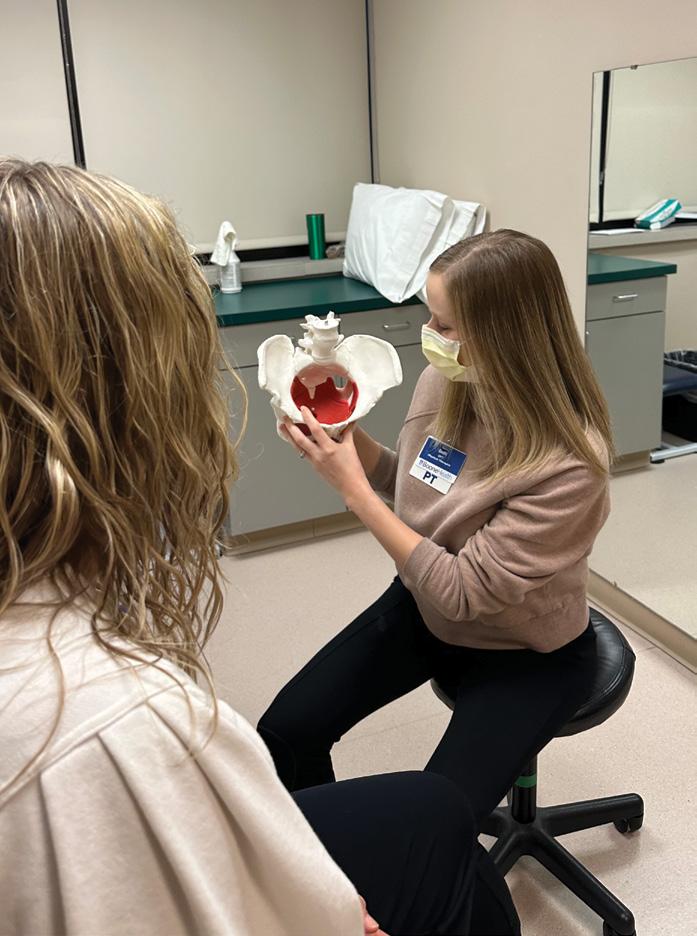Pelvic Floor Therapy
“Life changing” is how many Boone Health pelvic floor therapy patients describe their success. But what is pelvic floor therapy?
Pelvic floor therapy is a specialized kind of rehabilitation that works to lessen the symptoms of pelvic floor dysfunction through a personalized treatment program. It can improve pelvic pain, bladder control, bowel control, pelvic organ prolapse, pain during pregnancy and after childbirth, and pain with sexual intercourse.
The muscles of the pelvic floor sit inside the pelvis and support the internal organs, assist proper bowel and bladder function, contribute to sexual function, and support healthy movement of your hips and core. They are involved in a huge variety of daily activities and can significantly impact quality of life. Boone’s pelvic floor physical and occupational therapists have received specialized training to help you understand your pelvic floor and get back to the activities you love without limitation.
“When I first meet a patient, I spend time understanding their unique limitations and goals. Together, we develop a treatment plan that focuses on retraining the way the body moves and functions to meet those goals,” says Beth Frazier, one of Boone Health’s pelvic floor physical therapists.

On the first visit, the therapist assesses movement patterns, posture, breathing mechanics, hip and core strength, and performs any additional specialized tests pertinent to the symptoms. An internal vaginal or rectal examination is often recommended to assess the strength, muscle tension, and motor coordination of the pelvic floor. This exam also allows the therapist to assess for organ prolapse and check for scar tissue if applicable. An internal assessment provides valuable information for the patient and therapist to understand the root cause of the symptoms. However, internal examinations are completely voluntary based on patient comfort. The therapist and patient then develop a treatment plan that is catered to them.

“We may start working on coordination with very basic exercises laying on a mat and then gradually progress to higher level exercises and more functional activities. We use a variety of hands-on manual techniques to address pain, tight muscles, and scar tissue restriction such as massage, manipulation, and dry needling. We also teach patients stretches and breathing techniques to maintain that normal, pain-free muscle tone going forward,” says Beth.
Patient education is also a big part of pelvic floor therapy. Beth shares, “My biggest goal is always to help patients understand what is going on with parts of their body they may not know much about and begin to move in ways that are healthier, so they are able to do what they want to do without pelvic floor dysfunction. We have seen both men and women able to maintain bladder or bowel control after years of struggling. We have seen women return to exercises they thought they’d never be able to do again with prolapse. We have also seen women no longer experience painful sex that had been disturbing their relationship for years.”
Beth says she has seen lives changed by pelvic floor therapy. Ask your doctor for a referral to Boone Therapy if you think pelvic floor therapy may be right for you.
By Madison Loethen
Is pelvic floor therapy right for me?

Pelvic Pain: Increased tightness in the muscles of the pelvic floor can lead to pelvic pain. This can make pelvic exams, the use of menstrual products, and sexual activity very painful or even impossible. Pelvic floor therapy will guide you in understanding the root causes of your pain and beginning the road to recovery.

Bladder Control: Individuals of all ages deal with urinary leakage during activities like coughing, sneezing, and jumping. The muscles of the pelvic floor support the bladder to sit in the correct position. Bladder control issues may be caused by weakness or tightness of the muscles of the pelvic floor. Pelvic floor therapy will help you understand how your pelvic floor works together with your core.

Bowel Control: Bowel control issues include chronic constipation and fecal leakage. Pelvic floor therapists work as part of a multi-disciplinary team with your physician, dieticians, and gastrointestinal specialists to help you begin regaining bowel control.

Pelvic Organ Prolapse: Often experienced as a sensation of pelvic heaviness, pelvic organ prolapse can occur after childbirth or after repetitive straining during activities like weightlifting or toileting. When one or more organs, including the bladder, uterus, or rectum, have dropped lower than their normal position, this is considered prolapse. A pelvic floor therapist can help you understand if prolapse may be the root cause of your pelvic heaviness and teach you pressure management techniques to manage your symptoms.

Pregnancy and Postpartum Rehabilitation: A variety of aches and pains can arise during pregnancy that suddenly limit your ability to move. Boone’s pelvic floor therapists are specially trained to understand the issues that arise during pregnancy and the postpartum healing phase. They specialize in addressing pubic bone pain, sacroiliac pain, pelvic pain, and diastasis recti (commonly called “ab split”).
Pelvic floor therapy can help you regain the function you had prior to childbirth and return to movement without limitation.
By Madison Loethen